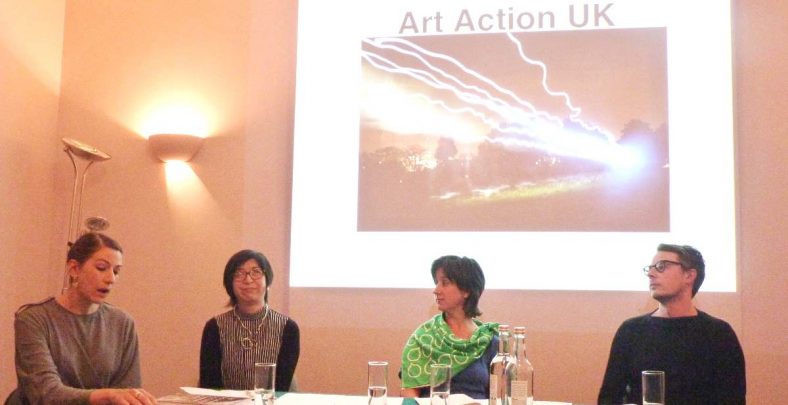 Seminar
SeminarThursday 6 October 2016
6:00pm – 7:00pm
Art and Deep Time: Contemporary Art in Japan after 2011
Drinks reception: 7:00pm – 8:00pm
13/14 Cornwall Terrace, Outer Circle (entrance facing Regent's Park), London NW1 4QP
Organised by the Daiwa Anglo-Japanese Foundation
This illustrated presentation and panel discussion of artists’ works highlights the impact of contemporary Japanese art since 2011, in relation to international discourse on deep time and the nuclear Anthropocene. ‘Deep time’ refers to geologic time – a scale of time vastly greater than the scale of human time. In the geological timescale, the Anthropocene is the most recent period of the Earth’s history in which human activity has become the dominant influence on the climate and environment. The Anthropocene is a crucial area of research within the social sciences and the humanities, because it highlights the significance of climate change and generates critical engagement with the evolution of nuclear energy production.
Around the world artists are making works that engage with these conversations, allowing us to consider deep time in relation to immediate human experiences. Artists in Japan are particularly sensitive to nuclear events, not only responding to the atomic bombings of Hiroshima and Nagasaki, but also to the way in which Japan has embraced atomic energy production. Following the detonation of the first nuclear bomb in 1945, which hailed the Atomic Age, ‘the nuclear’ proliferated throughout science, popular culture and art – especially in the 1960s and 70s. Although often represented positively, ambivalence towards nuclear power and weapons systems has persisted.
The nuclear disaster in Fukushima acted as a game changer, provoking powerful responses within the cultural sector. Artists, writers and filmmakers continue to address nuclear energy issues and to intensify the politicization of art. These interventions generate important questions about deep time and the nuclear Anthropocene, not just in Japan, but globally.
This event is coordinated by Art Action UK in association with Arts Catalyst.
Art Action UK is a collective that explores ways we can show solidarity and support for people who have been affected by natural and man-made disasters. It hosts an annual respite residency for artists who live and work in areas affected by disasters. Arts Catalyst is an arts organisation that commissions art that experimentally and critically engages with science.
A recording of the event can be found here:
About the contributors
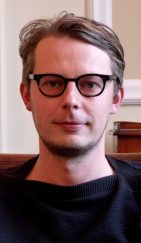
Jason Waite
Jason Waite is an independent curator focused on forms of practice toward forming agency across diverse fields such as art, society, politics and critical theory. He has co-curated Don’t Follow the Wind an ongoing project inside the uninhabited Fukushima exclusion zone, The Real Thing?, Palais de Tokyo, Paris, Maintenance Required, The Kitchen, New York, and White Paper: The Law by Adelita Husni-Bey at Casco – Office for Art, Design and Theory, Utrecht where he was curator. He is presently a doctoral candidate in Contemporary Art History and Theory at the Ruskin School of Art and Christ Church, University of Oxford.
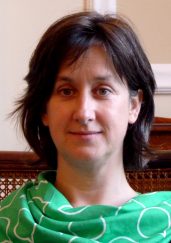
Dr Ele Carpenter
Dr Ele Carpenter is a curator, writer and researcher in politicised art and social networks of making. She is curatorial researcher in Nuclear Culture with The Arts Catalyst, Senior Lecturer in MFA Curating and convenor of the Nuclear Culture Research Group at Goldsmiths, University of London. The research and development stage of the Nuclear Culture project was supported by an AHRC Early Career Research Fellowship, and Arts Council of England. Ele worked with S-AIR in Sapporo to curate the Actinium exhibition, forum and field trips to nuclear sites in Japan. Her current projects includes, ‘Material Nuclear Culture’ at KARST, Plymouth; and ‘Perpetual Uncertainty’ Bildmuseet, Sweden. She is editor of The Nuclear Culture Source Book, Black Dog Publishing in partnership with Bildmuseet and Arts Catalyst.
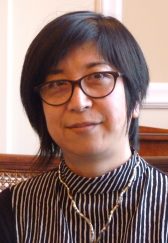
Kaori Homma
Kaori Homma is a Japanese artist based in London. She holds a BA in Fine Art from Tokyo University of the Art and Design and an MA in Fine Art Sculpture from Chelsea School of Art. She is an Associate Lecturer at University of Arts London (Camberwell College of Art and Central St Martins). Homma is also a co-founder and coordinator of Art Action UK. Her projects include the Homma Meridian Project, Street Road Artists Space, Meridian Stone Project and the Almutanabbi Street Starts Here Project. She has received numerous international accolades, including the Aqua Zero Award in Spain, the International Drawing Award in Hungary, the Sir Halley Stewart Trust Award and a British Council Travel Award.
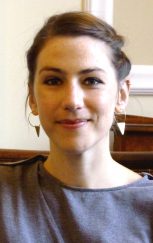
Jessica Holtaway (Chair)
Jessica Holtaway is a researcher and assistant tutor, currently under taking a PhD in the Department of Visual Cultures at Goldsmiths, University of London. Her research focuses on philosophy and political theory (in particular the writings of Jean-Luc Nancy) and explores how political art practices respond to, and surpass, familiar paradigms of globalisation.